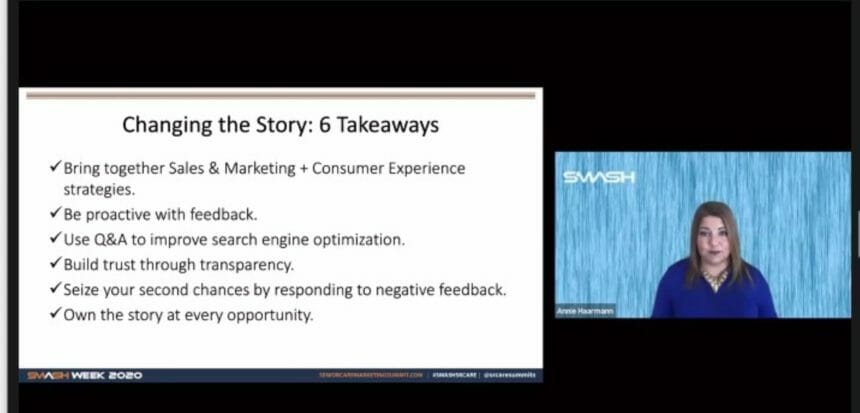
The coronavirus pandemic has changed everything when it comes to reputational management, according to the keynote speaker at SMASH Week 2020.
Annie Haarmann, head of strategic consulting for healthcare and life sciences for Reputation.com, said COVID-19 introduced the “perfect storm of reputational risk, operational change and crisis response.” Haarmann gave the keynote presentation at the Senior Care Sales & Marketing Summit, which went virtual this year due to the pandemic.
“It’s every marketer’s worst nightmare,” she said. “The pandemic has changed everything from the way we operate our communities to the way we expect a positive consumer experience.”
Haarman provided a roadmap to help providers “take back their story” and rebound from the reputational crisis amplified by negative media coverage. The way to do that, she said, is by creating a reputation and experience management program with the following key components:
- Bring together sales and marketing strategies with consumer experience strategies to look at things from a consumer’s perspective. Start with Google My Business by providing a visual and rounding out the listing with ways to convert that click through a call, directions or the ability to schedule a virtual tour.
- Be proactive with feedback. Don’t be afraid of negative reviews. By asking for reviews, more positive than negative feedback will come back. “Perception is the reality,” Haarman said, adding that it’s important when changing protocols to let consumers know exactly what to expect.
- Use Q&A to improve search engine optimization to drive the online story. “Q&A has become an essential part of telling your story,” Haarman said, adding that voice-based services such as Alexa have given rise to question-based search behaviors.
- Build trust through transparency. Solicit experiences from employees, residents and family members to provide a picture of what someone can expect when they visit a location.
- Seize second chances by responding to negative feedback. “Just because you have an unhappy customer in the first place doesn’t mean you can’t turn them around,” Haarman said. “Your response on these public platforms like Google is going to tell others that you care about the experience and this wasn’t the expectation for how your services should be provided.” Engaging with reviewers and responding to negative feedback speaks volumes.
- Own the story at every opportunity. Think beyond social media. Lift quotes from ratings and reviews and repurpose them into engaging content on a website. Update Google business listings as they are factored into Google’s algorithms and leads to better visibility in searches. Share successes through video testimonials.
“Getting found is no longer about simply improving your brand visibility online,” Haarman said. “It’s also about making it easier to access your communities and services.” she said.




